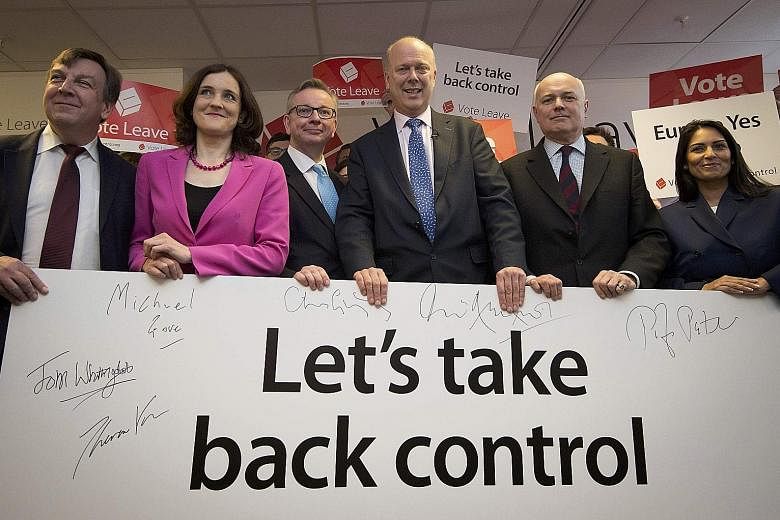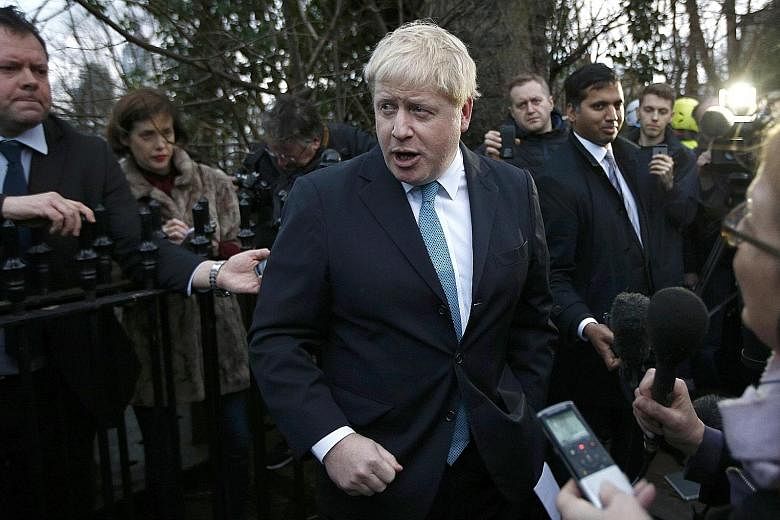British Prime Minister David Cameron has suffered a major personal blow after Mr Boris Johnson, the popular mayor of London, announced that he will defy the British leader and urge voters to opt for Britain's exit from the European Union in a referendum in June.
Ending months of speculation on his stance, Mr Johnson, or "BoJo" as he is known to his numerous fans, told voters that the EU remains "an ideal that we do not share".
Pointedly choosing to release his manifesto in The Daily Telegraph, the newspaper closest to the ruling Conservative Party to which both he and the Prime Minister belong, Mr Johnson said: "There is only one way to get the change we need, and that is to vote to go."
Mr Cameron is doing his best to minimise the impact of Mr Johnson's rebellion.
"Our message to everyone is we want Britain to have the best of both worlds - all the advantages of the jobs and investment that come with being in the EU, without the downsides," the Prime Minister's spokesman said.
But few doubt that the Cameron-Johnson showdown will define Britain for years to come.
Adored by party members for his friendly demeanour and amusing one-liners but dismissed by many fellow politicians as a lightweight, Mr Johnson is a master at reinventing himself.
Like Mr Cameron, he was educated at the exclusive Eton private school and at Oxford. Unlike Mr Cameron, however, Mr Johnson is not regarded as a stuffy aristocrat.
He has had a complicated lifestyle with a cast of wives and girlfriends, yet his biggest fans remain the elderly female members of the Conservative Party, an important constituency and one which usually has strong views on traditional family values. And he has won the mayoralty of London twice, despite Britain's capital usually voting Labour.
Now, the man who once said that "my policy on cake is pro having it, and pro eating it" has done it again over Europe.
Only earlier this month, Mr Johnson warned that if Britain chose to leave the EU, this would embroil the government in a "fiddly process of negotiating new arrangements, so diverting energy from the real problems of this country".
But now he waves away such problems as entirely "manageable", and argues that "restoring British sovereignty" is a far nobler objective.
Mr Johnson's change of heart over Europe is almost certainly due to calculations over his political future. His term as mayor expires in May and, at 51, he has made no secret of his aspirations to become prime minister.
However, he has never held a major government office and has been out of his party's parliamentary front bench since 2008. The conventional wisdom is that he needs a number of years in various senior positions before aiming for the party and country's leadership.
Time is not on Mr Johnson's side. Mr Cameron plans to retire in the next two years, well before the 2020 general election. If Mr Johnson is to have any chance of being a leadership candidate, he has to leapfrog other politicians such as Finance Minister George Osborne.
His anti-Europe stance achieves this objective. It puts Mr Johnson in the limelight as Mr Cameron's chief opponent. Mr Johnson reckons that this exercise is relatively risk-free. For if Britain votes against staying in the EU, it would be Mr Johnson who would appear the winner, and he would be the natural choice to replace Mr Cameron, who would have to resign in the aftermath of a referendum defeat.
But even if a majority of Britons vote to stay in the EU, Mr Johnson's career is unlikely to suffer as Mr Cameron is still likely to invite him to join the government to keep the peace within his fractured party.
But for Mr Cameron, the defection of Mr Johnson to the anti-EU camp is a grim reminder of how difficult the referendum campaign will be. It has already deflected attention from Mr Cameron's own appeal in Parliament yesterday, when he sought to reassure voters that remaining in Europe will not dilute Britain's national identity.
It has also provided the anti-EU campaigners with a high-profile, media-savvy recruit. Mr Johnson has been careful to steer clear of racist or anti-immigrant language, which is never far from the mouths of other anti-EU campaigners; his message is, therefore, much more potent.
All opinion polls indicate that the outcome of the June 23 referendum is now too close to call. And that's precisely the environment in which Mr Johnson thrives.


